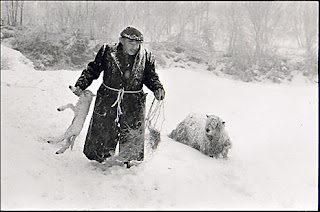A while back, BBC Four had one of their 'photography nights' which they do occasionally. I recorded them on DVD to watch later. Among the many programmes was one on a photographer I'd never heard of, James Ravilious.
When I saw his images I was impressed, very impressed. They seemed to be carefully crafted, perfectly composed and had a surreal quality to them.
James was the son of the famous painter Eric Ravilious and you can sense the influence painting and in particular, British painting had on James's work.
I find the images of rural life in Devon he did for the Beaford College stunning. The quality of the black and white images is superb, with detail in the shadows and highlights, even when he was shooting into the sun. His compositional skill is what I admire the most. James was a great admirer of Cartier-Bresson and many of James's pictures have that 'decisive moment' feel but also touches of surrealism.
James managed to achieve many candid shots because he had a strong relationship with the community he was photographing. He was accepted and his subjects were relaxed in his presence.
His images of rural life in north Devon is much more than just a record of a way of life in steady decline. They are poignant and beautiful. He captured all aspects of rural life in that area and created a tapestry of scenes of a way life which was disappearing. There was no real narrative I suppose, with a beginning and an end, it just was what it was, before it changed forever.
My own images of abandoned communities lack the sort of people that populate James's images and my images have less of an impact because of this absence of characters. It is for this reason that I pour over his images with a mixture of admiration, inspiration and pleasure but also with some sadness that 'my' characters, 'my' subjects have gone and left only silence.
All images © James Ravilious





1 comment:
Wonderful work. I was heavily influenced by Mr Ravilious for my Island Crofer bog - see here http://islandcrofters.blogspot.co.uk/2012/04/259.html
Post a Comment